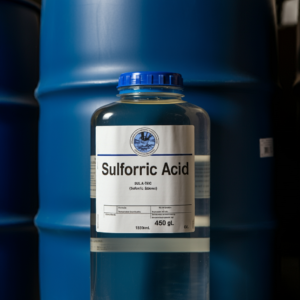To place an order for this product or other items, please contact us via email. Kindly include your company name, order quantity, and the desired product in your message, so we can assist you accordingly.
Brief Introduction:
Sulfuric acid (H₂SO₄) is one of the most important and widely used industrial acids. It is a colorless, highly corrosive liquid that plays a vital role in numerous chemical and industrial processes, including fertilizer production, chemical manufacturing, metal processing, and oil refining.
Product Category:
Sulfuric acid falls under the category of inorganic chemical compounds and mineral acids.
Applications:



Scientific Properties:
Consumption Barriers:
Hazards:
Standards:
Sulfuric acid must comply with ASTM (American Society for Testing and Materials) and ISO standards to ensure safety in industrial and chemical processes.
Storage Conditions:
Sulfuric acid should be stored in corrosion-resistant containers, away from moisture and organic materials. It must be kept in a cool, dry area, isolated from heat sources and flames.
Best Manufacturers:
Major Consumers: